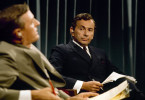So by now even my long-deceased grandmother probably knows that Selma was snubbed, of sorts, in the 2015 Academy Awards nominations. Depicting the events leading to the 1965 civil rights march from Selma to Montgomery, Ala., the film is up for Best Picture but a couple of other presumed nods for director (Ava DuVernay) and actor (David Oyelowo) went conspicuously un-nodded. And one could certainly argue that Selma screenwriter Paul Webb deserved a nomination too.
The omissions ignited small-c controversy. Rev. Al Sharpton demanded an emergency meeting over it, and you can bet money that Oscars host Neil Patrick Harris will make an ostensibly edgy-but-not-that-edgy joke or two about it when the interminable awards show airs Feb. 22.
While I would agree with Selma’s outraged proponents that DuVernay and Oyelowo had easily earned nominations, I don’t blame racism for the snub and, frankly, I think this whole Oscar business is being taken far too seriously. Hey, as a cinephile I love the Academy Awards — and not just for the plunging necklines and annual “bring out your dead” montage — but Oscar has a spotty record when it comes to aligning with cultural importance or artistic mastery. Orson Welles’ Citizen Kane lost the 1941 Best Picture to How Green Was My Valley, a lovely John Ford picture but hardly the equal of Welles’ groundbreaking masterpiece. In 1994 Forrest Gump bested Pulp Fiction; stupid is as stupid does, indeed. Four years later, Shakespeare in Love tragically upset Saving Private Ryan.
And the Best Picture category isn’t the only historic head-scratcher. Great actors given the Oscar high-hat treatment include Judy Garland, Robert Mitchum, Lauren Bacall, Richard Burton, Peter O’Toole, Peter Sellers and Glenn Close. And the list of legendary filmmakers who never won a Best Director statuette includes Alfred Hitchcock, Fritz Lang, Charlie Chaplin, Howard Hawks, Orson Welles, Federico Fellini, Ingmar Bergman, Stanley Kubrick, John Cassavetes, Sidney Lumet and Robert Altman. You get the idea.
Still, the no-shows of DuVernay and Oyelowo as Academy Award contenders are particularly perplexing because Selma seemed like such irresistible Oscar bait. Here is a story of obvious historical and cultural import given classical storytelling treatment, and with the added jolt of modern-day resonance. Selma details groundbreaking events of 50 years ago, but its reverberations originate from the aftershocks of Ferguson, Mo., and the death of Eric Garner at the hands of New York police — not to mention the ongoing political battles over voter identification laws.
Like Lincoln, Selma succeeds in capturing history because its scope is limited. The movie eschews biopic conventions that try squeezing complex lifetimes into 120 minutes. The focus here is a three-month period when Dr. Martin Luther King, Jr. (Oyelowo) coordinated protest marches in Alabama in an effort to pressure President Lyndon Johnson (Tom Wilkinson) into advancing a voting rights bill. Selma deftly conveys what was at stake, but the filmmaking is nimble and refreshingly free of the pretensions and bluster that saddle other productions of this ilk.
This is not a history lesson, or at least it doesn’t feel like one. At its most absorbing, Selma is a high-wire procedural of politics and political activism. DuVernay and company smartly avoid canonizing King, an American hero who has rarely been the subject of Hollywood cinema. Instead, we are presented with a heroic but flawed man susceptible to self-doubt and temptation.
It must be intimidating to take on the role of a bona fide icon, particularly one whose image is so fixed in America’s collective consciousness. Imitation can too easily lapse into shallow mimicry, while a more freewheeling interpretation (e.g. Anthony Hopkins as the title character in 1995’s Nixon) can test the limits of absurdity. Oyelowo, who was instrumental in keeping the project alive when prospective producers dwindled, delivers a perfectly calibrated performance. His deep voice and languorous cadence don’t copy MLK, but they do effectively convey King’s wary authority.
It’s an impressive job, but DuVernay matches it. The director chose not to take a screenwriting credit, but she had to weave MLK’s orations from whole cloth since the King family controls the copyright on the reverend’s public speeches and would not allow Selma to use them. Imagine how daunting it would be, say, to paint a reasonable facsimile of the Sistine Chapel. DuVernay, however, gives Oyelowo words and phrases that sound completely plausible as those of King, one of the greatest orators of the 20th century.
The ensemble cast boasts other top-flight actors. Carmen Ejogo projects tattered strength as Coretta Scott King, who suffered through her husband placing himself in harm’s way and, occasionally, in the beds of lovers. Wilkinson is fine as Lyndon Johnson, despite a butchered Texas drawl. Tim Roth is cartoonish evil as Alabama Gov. George Wallace, but the performance is riveting. DuVernay pays attention to smaller roles, too, as actors André Holland and Stephan James bear more than a passing resemblance to their respective roles of civil rights leaders Andrew Young and John Lewis.
Questions over whether the Lyndon Baines Johnson of Selma resembles reality have dogged the movie in recent weeks. A cadre of Johnson scholars and ex-advisors has taken to newspapers and the airwaves to dispute the movie’s suggestion that the nation’s 36th president only grudgingly advanced the Voting Rights Act of 1965. The controversy has prompted some mildly ridiculous commentary. Selma’s supporters harrumph that fiction is not obligated to be historically accurate, that truth is malleable and so on. Maybe. But if right-wing pundit Dinesh D’Souza made a historical fiction that characterized MLK as a charlatan who used the civil rights movement solely as a way to meet chicks, would there be the same contention that art need not be bothered with truth?
I would posit that there is a place for playing fast and loose with the truth, especially when a film’s satirical or fantastical slant — Hitler’s assassination in Quentin Tarantino’s Inglourious Basterds, say — is evident. But that is not always the case, and movies that twist history to elicit a specific emotional response can rightly be criticized for propaganda. The Birth of a Nation makes heroes of the Ku Klux Klan; one can acknowledge the film’s artistry while condemning its ugly distortion. Similarly, you’re allowed to have fun with They Died with Their Boots On, a very entertaining 1941 biopic about Gen. George Armstrong Custer, but that doesn’t excuse Hollywood for whitewashing the life of a racist scoundrel.
What doesn’t compute with the Selma-LBJ brouhaha, however, is this: The film casts Johnson in a relatively positive light. His White House meetings with Dr. King are tense, but they are not exactly adversarial. Johnson supports civil rights, but is also a political pragmatist who must juggle many issues. The only really dicey moment of historical revisionism, perhaps, is Selma’s suggestion that Johnson had then-FBI director J. Edgar Hoover (Dylan Baker) send Coretta King a secretly recorded audiotape of her husband having sex with another woman. Such treachery was commonplace for Hoover, but there is no evidence that Johnson was involved in such shenanigans.
Selma’s tug of war between King and Johnson is part of what makes the film so stirring. Both men are smart strategists. King is committed to the civil rights cause and willing to die for it, but he proceeds with caution, always thinking a few steps ahead about what action will spur what reaction. MLK recognized the importance of media and the power of the image, and he chose his battlefields with an eye on what would make the most potentially violent — and therefore influential — theater.
So does DuVernay, who, in her third directorial feature (and her first with anything resembling a comfortable budget) shows remarkable self-assuredness. The recreation of “Black Sunday,” when Alabama state troopers savagely attacked civil rights protesters at the Edmund Pettis Bridge, is almost breathtaking in its brutality. But Selma is punctuated by achingly beautiful moments, too, aided by Bradford Young’s sublime cinematography and “Glory,” the terrific John Legend-Common song that plays over the closing credits.
That song, in fact, is Selma’s second and final Oscar nomination. Whatev.





